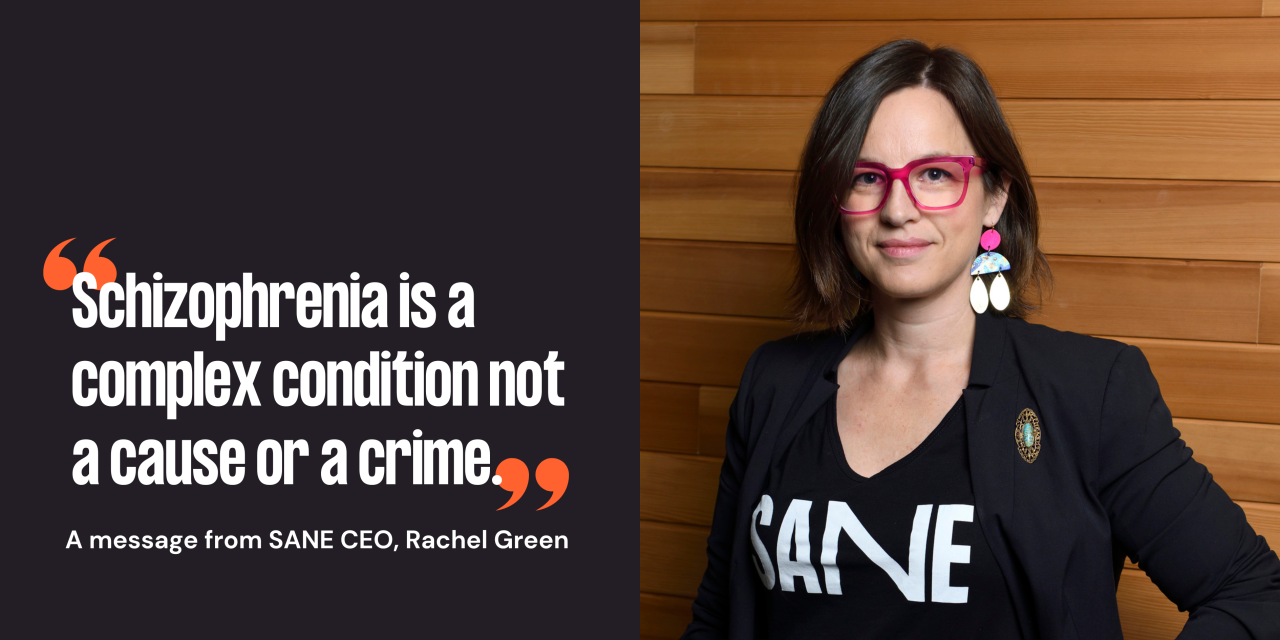The SANE Blog
Schizophrenia is a complex condition not a cause or a crime
As humans, we’re driven to seek answers.
When the unthinkable happens, our natural instinct is to try to make sense of it.
But in our rush to process the horror that unfolded in Bondi, we must resist the urge to draw simplistic conclusions.
While we grieve with the loved ones of those who lost their lives, the truth is, we may never know what drove this man to commit these terrible acts.
Despite this, many in the media and on social media, have drawn a straight line between his diagnosis of schizophrenia and his actions on that day. For some, this provides a neat explanation for what happened.
But a diagnosis of schizophrenia does not tell us everything we need to know.
Millions of Australians with mental illness live, work and play in the community, and with appropriate care and support, can live healthy, contributing lives. They are people like us.
Some people living with more severe or complex mental ill health require a higher intensity of care for them to thrive. Early intervention is critical. Long term, consistent and reliable support is needed not just for the individual but also for their family and carers.
Living with a mental illness does not make you inherently violent. The research is clear – people with mental health conditions are far more likely to be victims of crime than perpetrators.
When an incident of harm does happen, the tragedy is it will often be precipitated by days, weeks, months and even years of system failures within our mental health system, often compounded by related social factors like abuse, homelessness, poverty and substance use.
Rather than simply linking criminal behaviour with mental illness, the conversation we need to be having is how desperately under-resourced our mental health system is and has been for decades.
We don’t even know how many people in Australia are living with schizophrenia because the most recent data set is from 2007. This woefully out of date data directly impacts our ability to plan and resource services
As more details emerge of this man’s story, what is apparent is he fell through the gaps of a fragmented and inaccessible mental health system.
This will come as no surprise to struggling families and those working on the frontlines of a system at breaking point.
SANE’s recent Bridging the Gaps survey found that more than half of all people living with complex or long-term mental illnesses had not ever received assistance accessing mental health or social services.
Only seven per cent were able to access mental health care without paying a gap fee. Waiting lists for non-crisis psychiatric care was 6 months or more.
There is an urgent need to fund early intervention and prevention and psychosocial supports for people with complex presentations, to prevent deterioration that can lead to acute crisis.
It strikes me as a sad irony that the stigma faced by the many Australians living with complex mental health conditions – which is currently being exacerbated by sensationalist media reporting – can often be the reason they can’t access the support they need to stay well.
While public awareness of mild to moderate conditions like anxiety or depression has grown, and people sharing their personal experiences are often celebrated, this is not the case for conditions like schizophrenia.
The lack of public understanding can create barriers to housing and employment, and sometimes mental health care, because they’re deemed “too complex.”
At SANE, we hear this story every day. Thousands of Australians access our online services for support and advice because they can’t get support anywhere else.
When tragedies like the one at Bondi happen, there is always an immediate cry for justice. , but there is a risk that justice might simply involve an expensive coronial inquest and a remembrance statue.
If we really want to make sure this doesn’t happen again, we need to stop tinkering around the edges and fund the mental health system properly. Fill the service gaps and provide access to the early intervention and support people need to get on a road to recovery.
We owe that to the victims and their families.
Rachel Green is the CEO of SANE.
SANE provides a range of free telephone and online support services for people over 18 years of age with complex mental health needs and their family, friends and carers. We offer different types and levels of support so you can find what works for you. Choose from counselling, peer support, online groups and events, 24/7 community forums, and online information and resources. Learn more at sane.org/get-support.
When you subscribe to the blog, we will send you an e-mail when there are new updates on the site so you wouldn't miss them.
